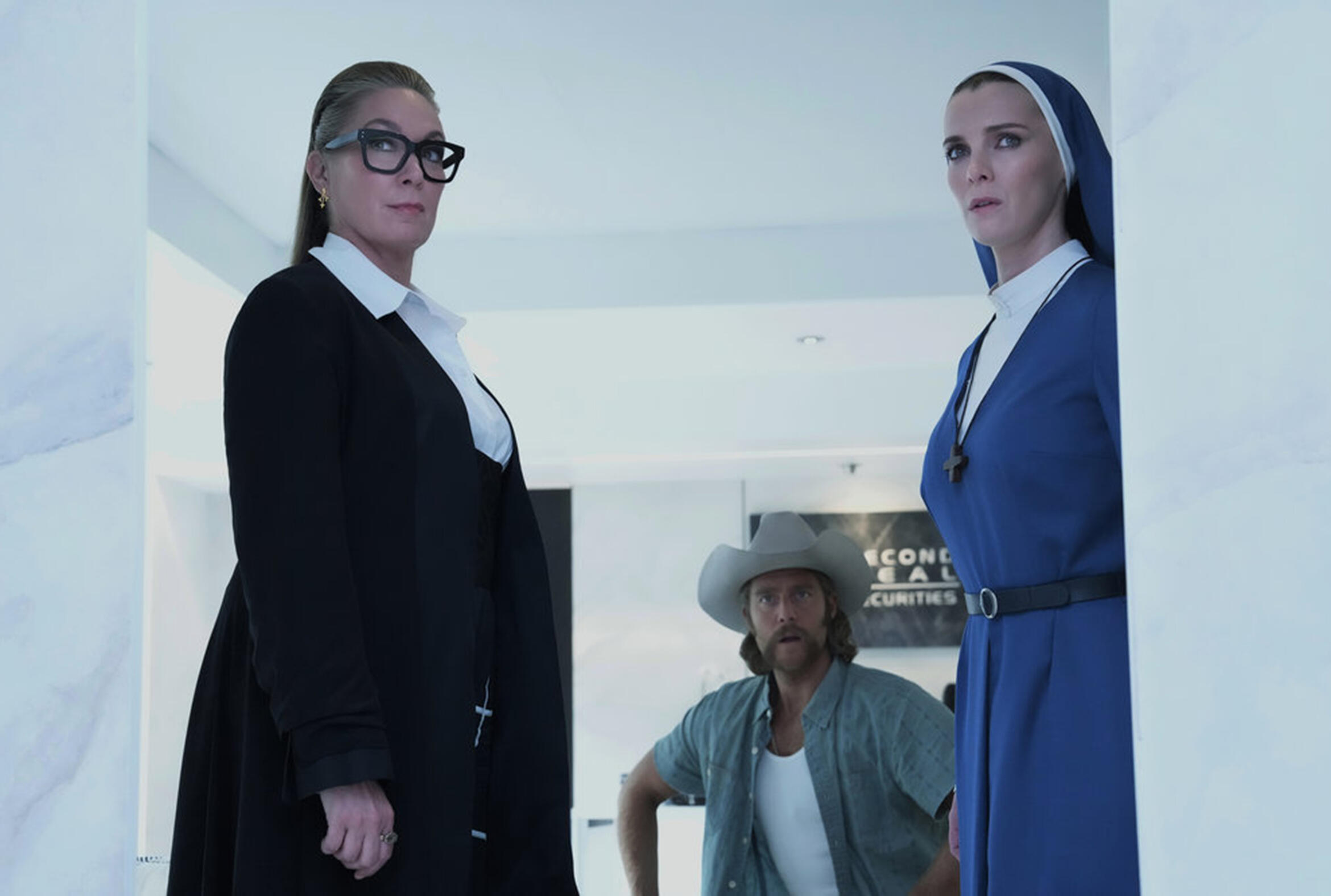Mrs. Davis Review: Brilliantly Silly Series About a Nun Fighting AI Will Win Your Devotion
Betty Gilpin, Mrs. Davis
Colleen Hayes/Peacock
There’s a karaoke scene in The Leftovers; hopefully you’ve seen it. Justin Theroux’s Kevin Garvey is stuck in a hotel that might be purgatory, and he can’t get home until he endures the mortifying ordeal of singing in public. Mrs. Davis takes the spirit of that scene — a quest so ridiculous it’s profound — then dials up the silliness and makes it a show. “Because it’s stupid!” Kevin protests on The Leftovers when asked to spin the afterlife’s karaoke wheel. “This is so dumb!” Mrs. Davis‘ Simone (Betty Gilpin) spits out at [redacted major reveal], a gag so good it’s made me happy for weeks. She’s right! And it’s brilliant!
Mrs. Davis, an exhilaratingly weird new Peacock series from Tara Hernandez (The Big Bang Theory) and Damon Lindelof (The Leftovers), dares you to doubt it. It dances over the line of acceptable foolishness; a few times in the early episodes, it nearly loses you only so it can win you back. What makes it work is its total commitment, which starts with its lead. Betty Gilpin, who was electric on GLOW, is back in the kind of go-for-broke role she deserves as Sister Simone, a nun at an offbeat convent who sets out to destroy an artificial intelligence algorithm known as Mrs. Davis. Gilpin, witty and unpredictable, moves through scenes like a human exclamation point, both heightening the comedy and grounding the emotion with piercing sincerity. She’s asked to do a little of everything, and she does it in a habit.

Mrs. Davis
Like
- It’s fun!
- Gilpin gives a brilliant lead performance
- The surprises really land
- The show digs joyfully into big questions
Dislike
- Some of its ideas get a little jumbled
For Simone, who blames the algorithm for a family tragedy, the fight against Mrs. Davis is personal. It also puts her at odds with almost everyone else in the world. The app is so beloved it’s made all other social media obsolete. People communicate with Mrs. Davis through a single earbud; the audience never hears her voice, so her users’ devotion to her is private. (The show’s creators named the app after Hernandez’s first- and second-grade teacher, shorthand for the kind of nurturing character most users see her as.) Simone, who’s not a user, only speaks to her through other people, and yet the AI seems to have infinite ways to get Simone’s attention. As with any authority figure, the full scope of Mrs. Davis’ power is clearest to those who cross her. And Simone’s best shot at taking her down is to complete a classic quest: to find and destroy the Holy Grail.
Why? There are certainly plot reasons, which the show cleverly twists more than once. It’s also just fun. Why not let a nun be Indiana Jones? One of Simone’s few allies on her quest is her childhood best friend and ex-boyfriend, Wiley (Jake McDorman), a former youth rodeo star who has his own reasons for wanting the algorithm gone. He’s started an underground resistance dedicated to thwarting Mrs. Davis with his bros. McDorman makes a funny, endearing sidekick, and he and Gilpin bounce jokes off each other like they’ve been doing it for years.
Wiley is an overgrown boy who surrounds himself with other lost boys, giving his side of the show a masculinity that’s cartoonish but also sweet. That balance is summed up in his friend JQ (Chris Diamantopoulos), a peacocky Australian who teeters on the edge of being obnoxious but totally pulls it off. Such is the power of Mrs. Davis‘ cast. Andy McQueen brings soul to a tricky part as Jay, a character I can’t say anything about. Ben Chaplin plays a professor stranded on an island (a nod to Lindelof’s work on Lost), Margo Martindale plays Simone’s Mother Superior, and Evil‘s Katja Herbers has a scene-stealing role as a key figure in Simone’s quest.
Mrs. Davis, the app, might not be self-aware, but the series absolutely is, and it winks at viewers as it goes. The fantastic fifth episode is a story told mostly in flashback, with Simone and Wiley playing Statler and Waldorf in the audience, weighing in on every twist. (“It’s kind of like a recurring theme,” Wiley observes.) In another episode, Wiley warns Simone, “Don’t underestimate just how stupid this gets, sweetheart,” and in still another he tells a mysterious priest (Tom Wlaschiha), “I would advise you to ground your performance. You’re way too big.” Simone repeatedly reminds Wiley not to over-explain himself, an artistic mission statement the series also (usually) follows. One of the show’s worries is that technology will sap the magic out of life by offering up all the answers; there’s joy in not understanding everything, and Mrs. Davis gives you that joy.

Jake McDorman and Betty Gilpin, Mrs. Davis
Greg Gayne/Peacock
The daughter of Reno stage magicians (played by Elizabeth Marvel and David Arquette), Simone is suspicious of being played for a fool in someone else’s grand plan. In magician terms, she hates to be forced: “It’s when you think you’re choosing something, but it’s already been chosen for you.” But as a nun, she wants her own kind of magic — from a belief system Mrs. Davis threatens — and sometimes wonders if she’s submitting to a different kind of force. Beyond all the playful chaos, Mrs. Davis asks earnest, if slightly jumbled, questions about whether life unfolds according to a plan, whether that plan is intelligent or not, and whether authority can also be love. By the end, all of its ideas seem to be metaphors for one another, and they can all be traced back to the fraught relationship between mothers and daughters.
There’s no avoiding the timeliness of a show about AI right now, when the hottest debate in tech is whose job will be obsolete next. Is this a “technology is bad” show? Not exclusively. Mrs. Davis is alternately skeptical and terrified by what our phones can do (when Mrs. Davis speaks through someone, it can feel like possession in a horror movie), but the series is also willing to acknowledge the good: the possibility of connection, the opportunity to help strangers, even the comfort of distraction. It’s concerned, but it’s not a scold. The writers used an algorithm (developed by writer Jonny Sun) to craft the episode titles, giving them hits like “A Baby With Wings, a Sad Boy With Wings and a Great Helmet.” Maybe artificial intelligence is doing just fine at poking holes in itself on its own.
It’s difficult to talk about Mrs. Davis without spoiling the thrill of it — some of the show’s coolest ideas are surprises, and the gags keep coming. Anything that seems serious could get made fun of later, anything that seems funny could turn heartfelt, and the best elements of the series are both at once. If I wanted to critique it, I’d point out that the third episode is the closest Mrs. Davis comes to a slow hour; there’s a Hands on a Hardbody-style competition that drags in the middle. The show’s timeline doesn’t necessarily add up. And its theology is hard to make sense of without bending your brain, but, then again, sense isn’t the point. Mrs. Davis is devoted to the sanctity of the inexplicable. It’s a show that invites you to study the details, but it’s also one that works so well when you just let it wash over you, a feeling rather than an algorithm.
Premieres: First four episodes premiere Thursday, April 20 on Peacock, followed by new episodes each Thursday
Who’s in it: Betty Gilpin, Jake McDorman, Andy McQueen, Elizabeth Marvel, Ben Chaplin, David Arquette, Chris Diamantopoulos, Katja Herbers, Mathilde Ollivier, Margo Martindale
Who’s behind it: Tara Hernandez and Damon Lindelof (co-creators)
For fans of: The Leftovers at its weirdest
How many episodes we watched: 8 of 8
Source: News

